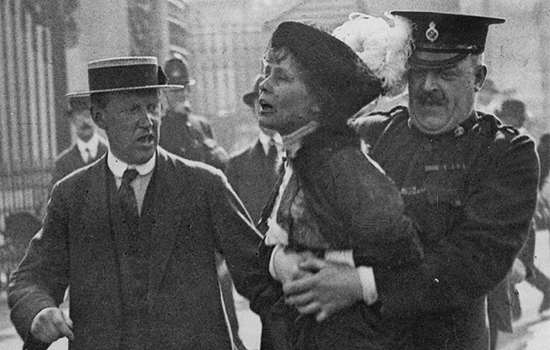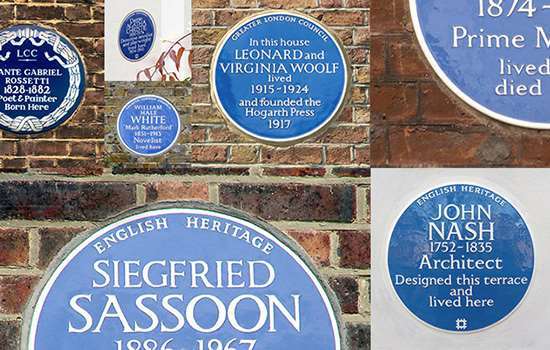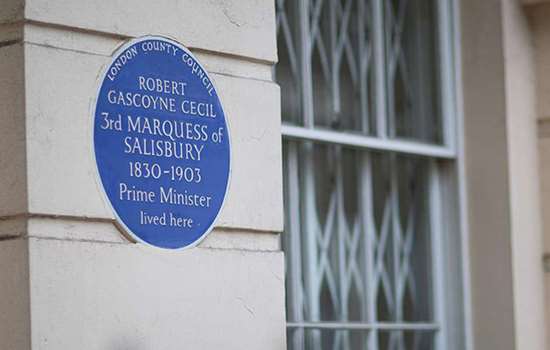BESANT, Annie (1847–1933)
Plaque erected in 1963 by London County Council at 39 Colby Road, Gipsy Hill, London, SE19 1HA, London Borough of Southwark
All images © English Heritage
Profession
Social Reformer
Category
Philanthropy and Reform, Religion
Inscription
ANNIE BESANT 1847-1933 Social Reformer lived here in 1874
Material
Ceramic
Controversial in her own lifetime, Annie Besant was, at different points in her life, a freethinker, a journalist, a publisher and editor, an atheist, a promoter of birth control, a socialist, a theosophist and a political leader. A blue plaque at 39 Colby Road, Gypsy Hill, marks the place where she lived in 1874.
Marriage and Separation
Annie Wood was born in the City of London into a family of Irish origin. She married Frank Besant, a clergyman (and a brother of Sir Walter Besant), in 1867. However, her loss of religious faith led to their separation in 1873. In 1874 Annie moved with her daughter Mabel, her ailing mother Emily and their maid, to the recently built house at 39 (formerly 26) Colby Road, Gipsy Hill. Divorce was unthinkable for her husband, who retained custody of their son.
Living in London, Annie Besant supplemented a small allowance from her husband with money earned from writing articles commissioned by the free thinker Thomas Scott. In August 1874 she gave her first public lecture, later published as The Political Status of Women.
Besant left the modest house in October 1874. Her later, longer-term London addresses in Paddington, Hampstead and St John’s Wood have been demolished.
While resident in Colby Road, Besant was introduced by a neighbour to Charles Bradlaugh, President of the National Secular Society, and was soon contributing to their paper, the National Reformer.
Political and Social Work
A decade later, Besant became one of the earliest members of the socialist organisation the Fabian Society, alongside Beatrice and Sidney Webb and George Bernard Shaw.
She supported Irish Nationalism and Home Rule, and was part of the Bloody Sunday demonstration in London on 13 November 1887.
As a member of the (Marxist) Social Democratic Federation (SDF), she was elected the SDF candidate to the London School Board in Tower Hamlets (1888–91). There she was instrumental in the abolition of fees for board schools and providing free school dinners and medical examinations.
A brilliant orator, Besant was equally persuasive – and controversial – in print. As co-editor of The Link, the journal of the Law and Liberty League, she highlighted the poor conditions suffered by workers at the Bryant and May factory in Bow and supported the successful Match Girls’ Strike and resulting trade union.
Birth Control and Theosophy
In 1877 Besant and Bradlaugh set up the Freethought Publishing Company and reissued Charles Knowlton’s 1835 treatise on birth control, The Fruits of Philosophy. This resulted in their sensational trial under the Obscene Publications Act (1857). The jury ruled against the sixpenny pamphlet but their convictions were reversed on appeal.
Besant then published her own advice, The Law of Population (1878), dedicated to the ‘poor in great cities and agricultural districts’. She agreed with Thomas Malthus’s theory that nature produces more life than it can support, but not his solution of late marriages for the poor, arguing that ‘the more marriage is delayed, the more prostitution spreads’.
She was also vehemently against abortion, and the ‘unnatural checks’ on population accepted by Malthus: starvation and disease. Instead she recommended birth control by the barrier method – for married couples only – stating it was ‘immoral to bring children into the world when you cannot clothe, feed or educate them’. More unpalatable is her statement that ‘the whole British race would gain in vigour, in health, in longevity, in beauty, if only healthy parents gave birth to children’.
In 1878 she lost custody of her daughter because she refused to give her religious instruction and because – so the court decided – she might grow up to publish works similar to those of her mother.
In the late 1880s Besant became a Theosophist and in 1891 she renounced birth control because it was incompatible with this belief system, the aims of which were universal brotherhood, the study of comparative religions and investigation of the mystic powers of life and matter. She withdrew The Law of Population from publication and refused to sell the copyright. But she defended her right to publish both it and The Fruits of Philosophy on grounds of free discussion.
India and Later Life
In tune with Theosophy’s emphasis on the study of religions from Eastern cultures, Besant lived mostly in India from 1893. There she founded the Central Hindu College in Benares and was briefly put under house arrest as a result of her strong advocacy of Indian self-rule. She was president of the Theosophical Society from 1907 and in 1917, aged 72, became president of the National Indian Congress.
In 1927, while addressing a large gathering of Theosophists in Berlin, she ‘prophesied a powerful federation of Teutonic races, including Germany, Great Britain and America’ (The Manchester Guardian, 20 August 1927). This was intended spiritually as well as racially but now has more sinister undertones.
Besant died at Adyar, Madras (now Chennai) in 1933.
Further Reading
Annie Besant, An Autobiography (London, 1893) (accessed 3 Nov 2020)
Anne Taylor, Besant [nee Wood], Annie (1847–1933), Oxford Dictionary of National Biography (2004) (subscription required: accessed 3 Nov 2020)
Gareth Stedman Jones, The Flight of a Clergyman’s Wife, London Review of Books, 15, (27 May 1993) (accessed 3 Nov 2020)
Nearby Blue Plaques
More About Blue Plaques



